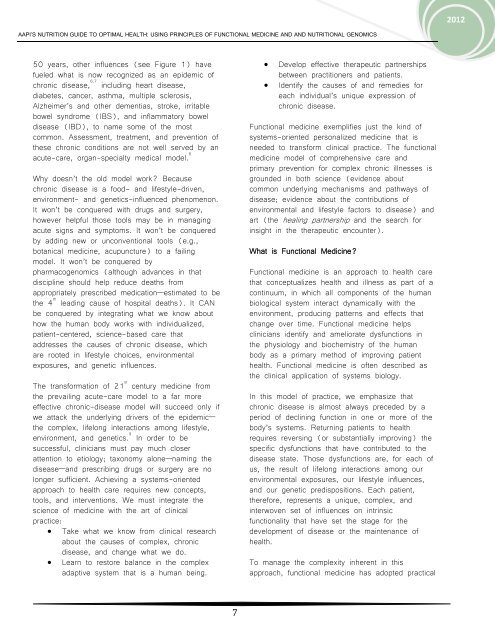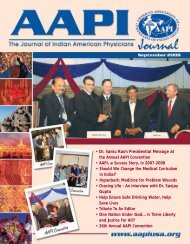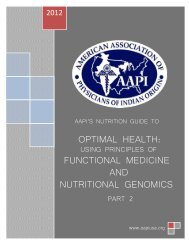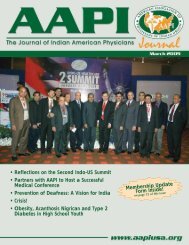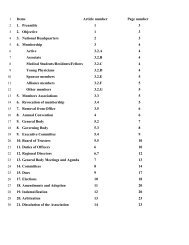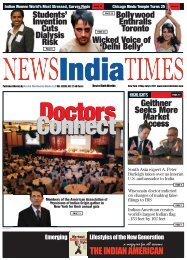functional medicine and nutritional genomics - American Association ...
functional medicine and nutritional genomics - American Association ...
functional medicine and nutritional genomics - American Association ...
You also want an ePaper? Increase the reach of your titles
YUMPU automatically turns print PDFs into web optimized ePapers that Google loves.
AAPI’S NUTRITION GUIDE TO OPTIMAL HEALTH: USING PRINCIPLES OF FUNCTIONAL MEDICINE AND AND NUTRITIONAL GENOMICS<br />
50 years, other influences (see Figure 1) have<br />
fueled what is now recognized as an epidemic of<br />
chronic disease, 6,7 including heart disease,<br />
diabetes, cancer, asthma, multiple sclerosis,<br />
Alzheimer’s <strong>and</strong> other dementias, stroke, irritable<br />
bowel syndrome (IBS), <strong>and</strong> inflammatory bowel<br />
disease (IBD), to name some of the most<br />
common. Assessment, treatment, <strong>and</strong> prevention of<br />
these chronic conditions are not well served by an<br />
acute-care, organ-specialty medical model. 8<br />
Why doesn’t the old model work? Because<br />
chronic disease is a food- <strong>and</strong> lifestyle-driven,<br />
environment- <strong>and</strong> genetics-influenced phenomenon.<br />
It won’t be conquered with drugs <strong>and</strong> surgery,<br />
however helpful those tools may be in managing<br />
acute signs <strong>and</strong> symptoms. It won’t be conquered<br />
by adding new or unconventional tools (e.g.,<br />
botanical <strong>medicine</strong>, acupuncture) to a failing<br />
model. It won’t be conquered by<br />
pharmaco<strong>genomics</strong> (although advances in that<br />
discipline should help reduce deaths from<br />
appropriately prescribed medication—estimated to be<br />
the 4 th<br />
leading cause of hospital deaths). It CAN<br />
be conquered by integrating what we know about<br />
how the human body works with individualized,<br />
patient-centered, science-based care that<br />
addresses the causes of chronic disease, which<br />
are rooted in lifestyle choices, environmental<br />
exposures, <strong>and</strong> genetic influences.<br />
The transformation of 21 st<br />
century <strong>medicine</strong> from<br />
the prevailing acute-care model to a far more<br />
effective chronic-disease model will succeed only if<br />
we attack the underlying drivers of the epidemic—<br />
the complex, lifelong interactions among lifestyle,<br />
environment, <strong>and</strong> genetics. 9 In order to be<br />
successful, clinicians must pay much closer<br />
attention to etiology; taxonomy alone—naming the<br />
disease—<strong>and</strong> prescribing drugs or surgery are no<br />
longer sufficient. Achieving a systems-oriented<br />
approach to health care requires new concepts,<br />
tools, <strong>and</strong> interventions. We must integrate the<br />
science of <strong>medicine</strong> with the art of clinical<br />
practice:<br />
� Take what we know from clinical research<br />
about the causes of complex, chronic<br />
disease, <strong>and</strong> change what we do.<br />
� Learn to restore balance in the complex<br />
adaptive system that is a human being.<br />
7<br />
� Develop effective therapeutic partnerships<br />
between practitioners <strong>and</strong> patients.<br />
� Identify the causes of <strong>and</strong> remedies for<br />
each individual’s unique expression of<br />
chronic disease.<br />
Functional <strong>medicine</strong> exemplifies just the kind of<br />
systems-oriented personalized <strong>medicine</strong> that is<br />
needed to transform clinical practice. The <strong>functional</strong><br />
<strong>medicine</strong> model of comprehensive care <strong>and</strong><br />
primary prevention for complex chronic illnesses is<br />
grounded in both science (evidence about<br />
common underlying mechanisms <strong>and</strong> pathways of<br />
disease; evidence about the contributions of<br />
environmental <strong>and</strong> lifestyle factors to disease) <strong>and</strong><br />
art (the healing partnership <strong>and</strong> the search for<br />
insight in the therapeutic encounter).<br />
What is Functional Medicine?<br />
Functional <strong>medicine</strong> is an approach to health care<br />
that conceptualizes health <strong>and</strong> illness as part of a<br />
continuum, in which all components of the human<br />
biological system interact dynamically with the<br />
environment, producing patterns <strong>and</strong> effects that<br />
change over time. Functional <strong>medicine</strong> helps<br />
clinicians identify <strong>and</strong> ameliorate dysfunctions in<br />
the physiology <strong>and</strong> biochemistry of the human<br />
body as a primary method of improving patient<br />
health. Functional <strong>medicine</strong> is often described as<br />
the clinical application of systems biology.<br />
In this model of practice, we emphasize that<br />
chronic disease is almost always preceded by a<br />
period of declining function in one or more of the<br />
body’s systems. Returning patients to health<br />
requires reversing (or substantially improving) the<br />
specific dysfunctions that have contributed to the<br />
disease state. Those dysfunctions are, for each of<br />
us, the result of lifelong interactions among our<br />
environmental exposures, our lifestyle influences,<br />
<strong>and</strong> our genetic predispositions. Each patient,<br />
therefore, represents a unique, complex, <strong>and</strong><br />
interwoven set of influences on intrinsic<br />
<strong>functional</strong>ity that have set the stage for the<br />
development of disease or the maintenance of<br />
health.<br />
To manage the complexity inherent in this<br />
approach, <strong>functional</strong> <strong>medicine</strong> has adopted practical<br />
2012


